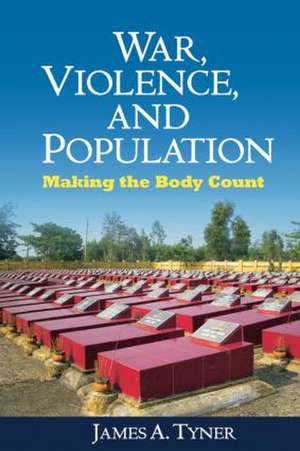War, Violence, and Population: Making the Body Count
Autor James A. Tyneren Limba Engleză Paperback – 8 apr 2009
Grounded in theory and research, this book offers a spatial perspective on how and why populations are regulated and disciplined by mass violence—and why these questions matter for scholars concerned about social justice. James Tyner focuses on how states and other actors use acts of brutality to manage, administer, and control space for political and economic purposes. He shows how demographic analyses of fertility, mortality, and migration cannot be complete without taking war and genocide into account. Stark, in-depth case studies provide a powerful and provocative basis for retheorizing population geography.
Winner--AAG Meridian Book Award for Outstanding Scholarly Work in Geography
Winner--AAG Meridian Book Award for Outstanding Scholarly Work in Geography
Preț: 244.67 lei
Preț vechi: 309.99 lei
-21% Nou
Puncte Express: 367
Preț estimativ în valută:
46.82€ • 50.06$ • 39.04£
46.82€ • 50.06$ • 39.04£
Comandă specială
Livrare economică 28 martie-11 aprilie
Doresc să fiu notificat când acest titlu va fi disponibil:
Se trimite...
Preluare comenzi: 021 569.72.76
Specificații
ISBN-13: 9781606230374
ISBN-10: 1606230379
Pagini: 226
Dimensiuni: 152 x 229 x 18 mm
Greutate: 0.32 kg
Ediția:1
Editura: Guilford Publications
Colecția Guilford Press
ISBN-10: 1606230379
Pagini: 226
Dimensiuni: 152 x 229 x 18 mm
Greutate: 0.32 kg
Ediția:1
Editura: Guilford Publications
Colecția Guilford Press
Public țintă
Professional Practice & DevelopmentNotă biografică
James A. Tyner is Professor of Geography at Kent State University. His research interests include mass violence, war, and social justice. The author of numerous books, articles, and book chapters, he is the recipient of the Glenda Laws Award from the Association of American Geographers, among other honors.
Cuprins
Foreword, Chris Philo
1. Journeys from the Killing Fields
2. Making the Body Count
3. Death and the Erasure of Space
4. Spaces of Unnatural Violence
5. Population and Peace Education
1. Journeys from the Killing Fields
2. Making the Body Count
3. Death and the Erasure of Space
4. Spaces of Unnatural Violence
5. Population and Peace Education
Recenzii
A principled and passionate analysis of the intimate connections between populations and political violence. Tyner's case studies of Vietnam, Cambodia, and Rwanda are vivid and searching demonstrations of the public importance of a critical population geography, and deserve an audience far beyond the academy.--Derek Gregory, Department of Geography, University of British Columbia, Canada
Tyner identifies valuable connections between population geography and poststructural and postcolonial theory, and helps scholars understand how particular forms of knowledge have legitimated and perpetuated specific geographies and histories of violence. This is an important book not only for what it contributes to the political vocabulary of population geography, but even more strikingly, for how it pushes forward understanding of the spatial politics of state-sanctioned violence and genocide.--Rachel Silvey, Department of Geography and Programme in Planning, University of Toronto, CanadaInspiring case-study chapters focused on Vietnam, Cambodia, and Rwanda pull no punches as they illustrate how bodies are disciplined and populations regulated through practices such as rape, the targeting of civilians, and ethnic cleansing. This is bold and compelling scholarship that will spark discussion and debate in courses on population and globalization, human geography, political economy, gender and critical race studies, and social justice and activism. The combination of theoretical depth and empirical breadth makes this the rare type of book that can be successfully used alongside journal articles or media material.--Adrian Bailey, School of Geography, University of Leeds, West Yorkshire, UK
Tyner places the theorizing and analysis of the human body center stage. His analysis of a topic generally neglected by population geographers charts an alternative future for population geography--and is a call for social justice and action. In contrast to mathematical and statistical spatial demography, which can be distanced and removed, Tyner's spatial demography of the violence done to human bodies is as much ethical as it is empirical. Making the case for a 're-humanization' of population geography, this compelling book will be of interest to a broad community of social scientists. It will be a useful supplementary text for an introductory cultural/human geography course or an advanced population geography or development course.--Richard Wright, Orvil E. Dryfoos Professor of Public Affairs and Geography, Dartmouth College
Tyner unpacks a rather overwhelming set of issues and questions related to the disciplining of bodies and the regulation of populations through acts of violence, in an exceptionally clear, straightforward, and compelling way. This book is marked by innovative and original scholarship from beginning to end. Highly readable, it will appeal to both scholars and students interested in issues related to social injustice and mass violence.--Emily Skop, Department of Geography and Environmental Studies, University of Colorado at Colorado Springs
Tyner examines the intimate connections between populations and political violence, and makes a timely contribution to the field of population geography that scholars from a wide range of disciplines will be obliged to take into account for many years....This book breaks new ground in the subfield of population geography....I found Tyner's analysis visually rigorous....Tyner's work is thoughtful and engaging....Warrants wide acclaim and an audience well beyond the academy and to the many of us concerned with bodies and militarized violence.
--Social and Cultural Geography, 3/6/2009Descriere
Grounded in theory and research, this book offers a spatial perspective on how and why populations are regulated and disciplined by mass violence—and why these questions matter for scholars concerned about social justice. James Tyner focuses on how states and other actors use acts of brutality to manage, administer, and control space for political and economic purposes. He shows how demographic analyses of fertility, mortality, and migration cannot be complete without taking war and genocide into account. Stark, in-depth case studies provide a powerful and provocative basis for retheorizing population geography.
Winner--AAG Meridian Book Award for Outstanding Scholarly Work in Geography
Winner--AAG Meridian Book Award for Outstanding Scholarly Work in Geography
